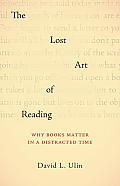
Here's a question I think about a lot: What are our expectations of nonfiction? I'm not referring to the morass stirred up by the term "creative nonfiction" because it goes without saying that all nonfiction is creative, as is all writing, all attempts to frame the chaos of existence and give it a shape. But more directly, do we come to nonfiction looking for a narrative, and if so what does that mean? I've spent much of yesterday talking (or virtually talking) to students about these issues, about the need for writers to shape material, even (or especially) if that material is true.
This was one of the challenges I faced in The Lost Art of Reading, how to give an idea that was, in essence, abstract (why is reading important? what does it offer us?) a concrete form. For me, the solution was to frame it with a story, the story of my attempt to read The Great Gatsby with my teenage son Noah, a story that, for me anyway, catalyzed the larger issues I wanted to address. It made sense because one of the fundamental arguments in the book is that we need story, that we are hard-wired for it as a species, that, as Joan Didion wrote more than 30 years ago, "We tell ourselves stories in order to live."
Yet Didion, it must be said, also recognized the limitations of that argument, the way the same stories that shore us up us also let us down. She follows her famous line with one far less remembered: "Or at least we do for a while." What this means, of course, is that even the most developed story is just a construction, and, like all human constructions, it will collapse beneath the weight of time.
In the face of that, it's hard to believe in story as a permanent ideal. But to me, that only makes our need for narrative more valuable because it offers us a bit of freedom — from ourselves, from posterity, even, in some fundamental fashion, from the truth. What is truth, after all, if even stories cannot sustain us? How can we know where it lies?
In our discussion yesterday, I offered up two quotes to my students, the first from Denis Johnson:
"But everything is like we think it is, don't you get it? Out of the million little things happening on this beach, you can only be aware of seven things at once, seven things at any given time.… We never really get the whole picture. Not even a microscopic part of it.… Our delusions are just as likely to be real as our most careful scientific observations."
And the second from Johnny Rotten: "I don't believe illusions / 'cos too much is real."
For me, nonfiction writing exists somewhere in between those two ideas, asking us to be as honest as we can, using the tools at our disposal, while also recognizing that those tools are inherently flawed.